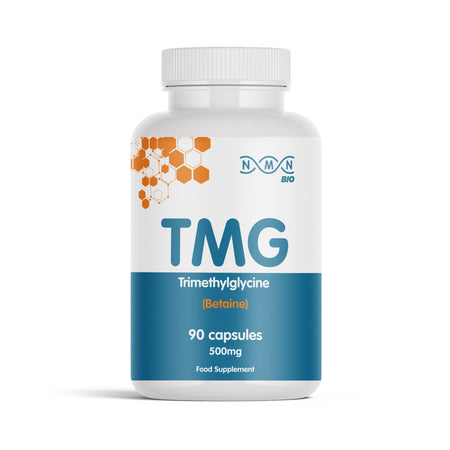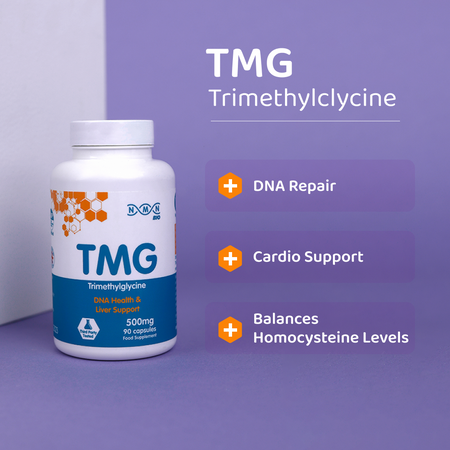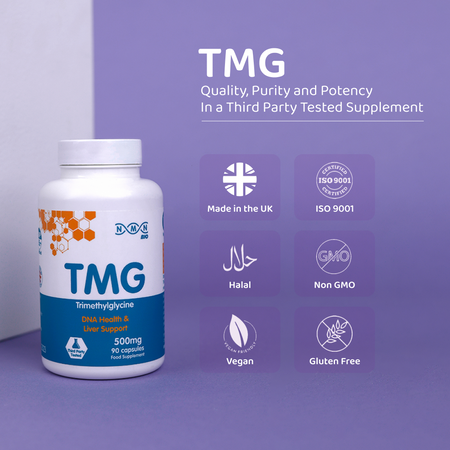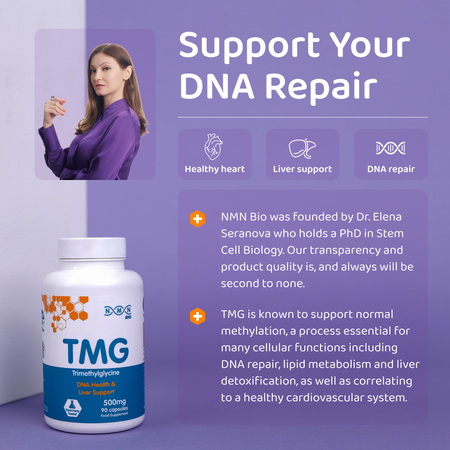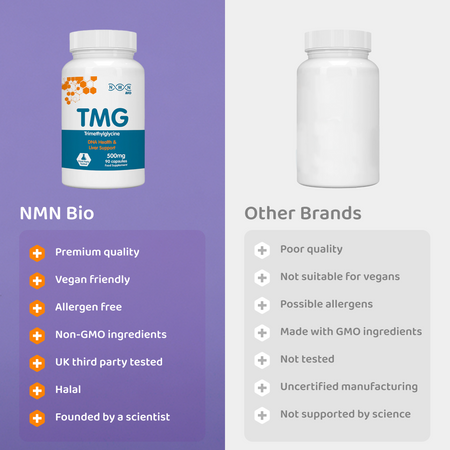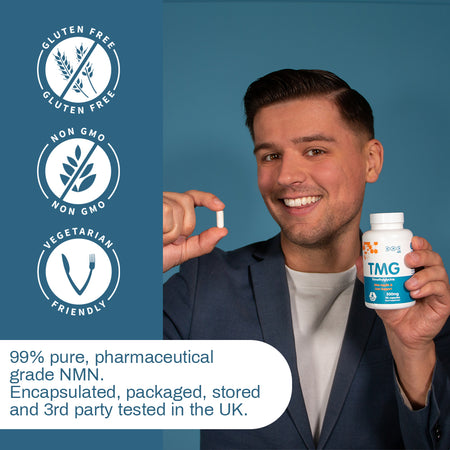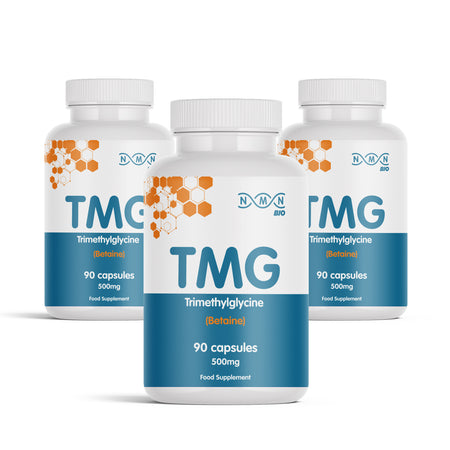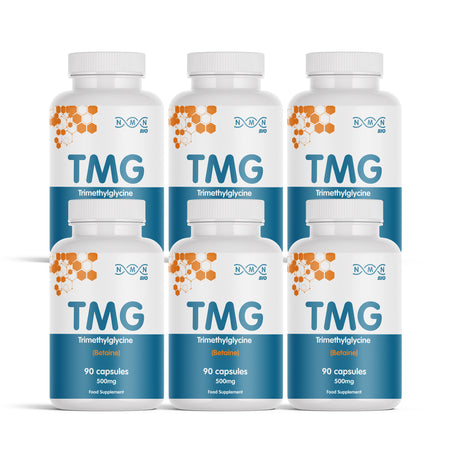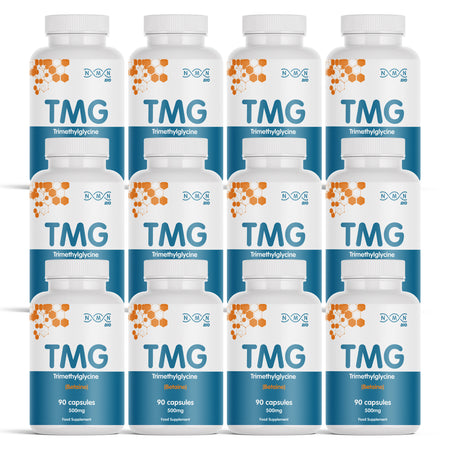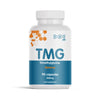FAQ
-
At what age I should start supplementing with TMG?
 TMG is an excellent supplement for anyone over 25. As our hormones and our NAD+ production peaks at this age, this is when the methylation starts being less and less efficient. TMG comes to the rescue, ensuring optimal DNA methylation (the housekeeping of your genes), preventing the toxic build up of the amino acid homocysteine and making sure your liver and heart maintain optimal function.
TMG is an excellent supplement for anyone over 25. As our hormones and our NAD+ production peaks at this age, this is when the methylation starts being less and less efficient. TMG comes to the rescue, ensuring optimal DNA methylation (the housekeeping of your genes), preventing the toxic build up of the amino acid homocysteine and making sure your liver and heart maintain optimal function. -
What is the optimal NMN to TMG ratio?
 This depends on your age and your individual genetics. Usually people start with a 1:1 ration of NMN and TMG. To ensure optimal methylation (as NMN utilises methyl groups to work its magic in your body), you can eventually (in 3-6 weeks) increase the ratio to 1:2, meaning that for each 500mg of NMN, you would need 1g of TMG. If you are supplementing with NMN for a long time already, you can start with 1:2 ratio, and then increase the ratio to 1:3 (1g of NMN to be taken with 3g of TMG). This can be done after about a month on the 1:2 ratio.
This depends on your age and your individual genetics. Usually people start with a 1:1 ration of NMN and TMG. To ensure optimal methylation (as NMN utilises methyl groups to work its magic in your body), you can eventually (in 3-6 weeks) increase the ratio to 1:2, meaning that for each 500mg of NMN, you would need 1g of TMG. If you are supplementing with NMN for a long time already, you can start with 1:2 ratio, and then increase the ratio to 1:3 (1g of NMN to be taken with 3g of TMG). This can be done after about a month on the 1:2 ratio. -
When should I take my TMG?
 You can take TMG either first thing in the morning along with your NMN, or right after breakfast with a glass of water
You can take TMG either first thing in the morning along with your NMN, or right after breakfast with a glass of water -
Does TMG have any side effects?
 TMG has no major side effects for most people. However, it is worth noting that TMG is an osmoregulator. This means that it is a molecule that helps your cells staying hydrated. In very high dosages(over 20g/day), this property can lead to a laxative effect, but this will not be the case if you stick to the recommended dosages of up to 3-4g a day.
TMG has no major side effects for most people. However, it is worth noting that TMG is an osmoregulator. This means that it is a molecule that helps your cells staying hydrated. In very high dosages(over 20g/day), this property can lead to a laxative effect, but this will not be the case if you stick to the recommended dosages of up to 3-4g a day.
Focus & Perform Like Never Before
Betaine, also known as trimethylglycine (TMG), has been studied for its multiple benefits when it comes to cellular health. From supporting DNA repair, to heart health and focus benefits for those suffering from ADHD, TMG is has an array of benefits for human health. Frequently used with NMN, a common anti-aging supplement, TMG is also an excellent supplement to enhance heart and liver health. With regards to focus and concentration, TMG acts as a catalyst for better neuronal function, and hence provides noticeable results in terms of managing symptoms of Attention Deficit Hyperactivity Disorder (ADHD). TMG may help regulate levels of neurotransmitters such as dopamine, serotonin, and norepinephrine. These neurotransmitters are involved in mood regulation, attention, and focus, and imbalances in their levels have been associated with ADHD symptoms. TMG supplementation has been linked to reduced stress responses in some studies. Stress exacerbates ADHD symptoms in many individuals, so reducing stress levels could potentially help manage ADHD symptoms. Read more about the TMG benefits for ADHD HERE.
Why Should I Use A Methylation Donor Such As TMG?
Aging is a big factor in our ability to maintain efficient methylation. As we get older our methylation ability declines and without adequate methylation our abilities to read and activate the correct parts of our DNA blueprints are hampered. Trimethylglycine (TMG) also called Betaine - is a naturally occurring substance in the body. It’s involved in liver function, cellular reproduction, and it helps make essential metabolic compounds.
Support Your Liver And Heart Health With TMG (Trimethylglycine)
TMG is a glycine molecule with 3 methyl groups attached to it, making it a supplement capable of supporting the vital process of methylation in the body. It also is proven to lower the levels of the harmful amino acid homocysteine, converting it into harmless methionine, according to multiple clinical studies. High levels of homocysteine are associated with cardiovascular and Alzheimer’s disease. Optimal levels of methylation are correlated with healthy liver and heart. TMG is an essential supplement that will nourish your cells and ensure your cellular maintenance is taken care of.
Supports DNA Repair
Research shows healthy methylation is important in keeping DNA healthy in every cell and organ of the body and by supporting healthy methylation TMG also helps facilitate DNA repair.
Excellent Addition To NMN Supplementation
TMG can be taken with NMN (which utilises methyl groups) for optimal efficacy. TMG will provide the necessary methyl groups for NMN to be as efficient as possible.
You may also like
Join the growing NMN BIO-Hackers community!
DISCLAIMER
Our formulations are backed by scientific research conducted by Dr. Elena Seranova and other researchers. While these studies support the potential benefits of individual ingredients, the statements made on this website have not been evaluated by regulatory authorities such as the FSA, FDA, MHRA, EMA, or their equivalents in other jurisdictions. These products are not intended to diagnose, treat, cure, or prevent any disease.
All information provided is for general informational purposes only and is not a substitute for professional medical advice, diagnosis, or treatment. You should not rely solely on this content when making health-related decisions.
Consult your healthcare provider before beginning any new supplement regimen, especially if you are pregnant, nursing, taking medication, or have a known medical condition. Do not discontinue or alter any prescribed medication without first consulting a qualified medical professional.
Product claims and regulatory status may vary by country. It is the responsibility of the purchaser to ensure that use of these products is compliant with local laws and regulations.




